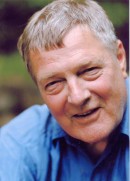Author: Bror Rönnholm
Desire versus apathy
14 May 2009 | Authors, Reviews

Claes Andersson. - Photo: Johan Bargum.
Bror Rönnholm on the poetry of Claes Andersson
‘Use it or lose it,’ writes Claes Andersson in his latest collection of poetry, Lust (‘Desire’, Söderström, 2008). The collection deals not only with the flesh and bones of things, but with thoughts and emotions: ‘First you are unfeeling then cold / then insensible’. And just like hate, love and desire, you will lose friendship too if you don’t use it.
Perhaps after 28 books and an active life as a psychiatrist, a politician and a jazz pianist, Claes Andersson (born 1937) has reached the age at which he realises that desire, in the broadest sense of the word, is not a self-evident, constantly regenerating spring, but something to nurture and to fight for. It goes without saying that an older person’s perspective and the proximity of death run through the collection like an active undercurrent. Despite the title there is also room for plenty of apathy in this collection. Or, rather, desire also has its darker, complicated sides. More…
Portraits in miniature
Issue 3/2006 | Archives online, Authors, Reviews
Susanne Ringell is an actress who never learned to enjoy the limelight. After ten years on stage she left it in order to concentrate on writing. She made her debut in 1993 with short stories, but by then she had already aroused attention with plays for stage and radio. She has also continued to write drama. It is hard to say what role her years in the theatre have played, but it does at least look as though the profession has left its mark in two important ways.
One is a close connection with the spoken word, which expresses itself as a sure sense for dialogue, but also as a strong interest in linguistic idioms. Worn-out phrases permeate the often slightly absurd scenes that are served up, and in Ringell’s work they seem to be just as much a source of inspiration as a means of expression. More…
The poetic absurdism of Catharina Gripenberg
30 June 2005 | Authors, Reviews

Photo: Linda Stråka
The wind blows a great deal in Catharina Gripenberg’s second collection of poems, Ödemjuka belles lettres från en till en (‘Humble belles lettres from one to one’, Schildts, 2002). In the first poem we meet three siblings who, on their way across a bridge, are scattered and thrown about by the wind. In another poem a house blows away as a family sit around the dinner table – an event that does not, however, give rise to feelings of vulnerability, but becomes an opening to the world instead.
Perhaps the wind can be seen as an image of Gripenberg’s poetic strategy, a poetry in which nothing is really held in place and where anything may happen. Behind this strategy one senses a resistance to rigidity and outward fixation and a defence of the power of the imagination and of poetry’s ability to create freedom. More…
The nearness of the past
30 March 2005 | Authors, Reviews

Kjell Westö. Photo Ulla Montan
Kjell Westö (born 1961) has to a large extent converted the needs and dilemmas of his own generation into material for his own writing.
It was a generation that came too late for the wave of politicisation of the 1970s, but it was strongly influenced by the reaction against it: individualism and postmodernism, the delirium of the ‘casino-economics’ of the 1980s and the crash that followed. True, Westö stood back from many of the currents of the time, but was clearly influenced by them nonetheless. More…
Moments and memories
Issue 2/1999 | Archives online, Authors, Reviews
moments
not of wonder but of
something closely related
It is almost as a programme declaration that these words introduce Mårten Westö’s third poetry collection Nio dagar utan namn (‘Nine days without names’, 1998).
He is palpably fascinated by what might be called poetic moments and by the cracks in reality that seem to open during them. Many of the book’s poems derive their energy from these moments of dreamy unreality and alarming clarity of vision, moments when reality acquires a quite different density and the self either experiences an intense contact with the world and itself, or a strong feeling of isolation and alienation mysterious and meaning-laden moments that live on in the memory. More…
-
About the author
Bror Rönnholm (born 1949) is a journalist, critic and poet from Turku. His latest collection of poetry, Från en grop i sommaren (‘From a pothole in summer’, Söderströms), was published in 2007.
© Writers and translators. Anyone wishing to make use of material published on this website should apply to the Editors.
